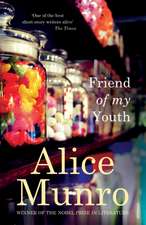The Syllabus of Errors
Autor Ashley James Stokesen Limba Engleză Paperback – 31 ian 2013
Preț: 145.89 lei
Nou
Puncte Express: 219
Preț estimativ în valută:
27.92€ • 30.42$ • 23.52£
27.92€ • 30.42$ • 23.52£
Carte tipărită la comandă
Livrare economică 23 aprilie-07 mai
Preluare comenzi: 021 569.72.76
Specificații
ISBN-13: 9780956422392
ISBN-10: 095642239X
Pagini: 206
Dimensiuni: 152 x 229 x 12 mm
Greutate: 0.31 kg
Editura: Unthank Books.com
ISBN-10: 095642239X
Pagini: 206
Dimensiuni: 152 x 229 x 12 mm
Greutate: 0.31 kg
Editura: Unthank Books.com
Notă biografică
Ashley Stokes is a Creative Writing lecturer for UEA and the OU, a Bridport Prize for Fiction Winner and Pushcart Prize nominee and his short fiction has appeared in over twenty journals and anthologies. His first novel TOUCHING THE STARFISH (Unthank Books, 2010) was described as "a work of an anarchic imagination stuffed with incident and mordantly humorous observations." Eastern Daily Press. For
Recenzii
Rum and Reviews Ashley Stokes has pulled off a very impressive stunt, having Pope Benedict XVI step down from office in the same week that his new book, The Syllabus of Errors, is published. Good work, sir! For those not in the know, the original Syllabus of Errors was a document issued by Pope Pius IX in 1864 to list the errors of popes from previous eras, covering such riveting topics as ethics, moderate rationalism, pantheism and suchlike. The toppling of a flawed pontiff could not have been better timed, and one with Nazi links? Perfect! Oh, and by the way, the original document isnʼt a patch on Ashley Stokesʼ book, so do take care when ordering from Amazon. My first taste of the Stokes pantheon came in the guise of Trans-Neptune, a short story in the excellent Unthology No. 3 published by Unthank Books in the November of last year. Having thoroughly enjoyed it, I relished the thought of getting my claws on his new publication, The Syllabus of Errors, a collection of ʻTwelve Stories of Obsession, Loss and Getting In A Stateʼ. As ever, his writing style is descriptive, immersive and accessible without being patronising. Stokes has a tale to tell and does not mess about in the telling of it. He has tremendous craft, a subtle talent for quickly sculpting characters that become instantly real and for transporting the reader to the landscape of his tales with minimum embellishment, a rare gift that is an essential tool for the short story writer. I raced through Island Gardens and Storming the Bastille, but did feel an initial worry that the book might become a disjointed catalogue of short disasters. And then I came to A Short Story about a Short Film. I confess, I put the book down. I must have been in the wrong frame of mind, but I just found it impossible to read. I gave it a week before I picked the book up again, skipping A Short Story about a Short Film and moved straight on to Post Leading Man. And I loved it. A struggling, indeed failing actor has to face a reality he cannot bear, shed a character he feels he owns. His bitterness seeps from the page, his humiliation and pride are raw in every sentence. This story dragged me right back into the book, and I read on with fresh vigour. As the stories passed I was put in mind of a sculpture I once saw in Rome, The Foot of Constantine at the Capitoline Museum. It is simply a huge foot, a fantastically carved fragment of what must have been a truly titanic statue. And this is what I thought of the stories in The Syllabus of Errors - these short stories are so well crafted, what must a Stokes novel be like? Am I only seeing fragments here? Of course, I was mistaken. It began to occur to me that threads ran from story to story, fine filaments at first, but as each new story began a new thread emerged, back in time by years, perhaps, decades even, or simply through the relationships of the characters. As soon as I became attuned to this theme in the book I noticed more and more the little hints and secrets, further threads, until I realised that perhaps The Syllabus of Errors might indeed be a novel, but perhaps not in the sense I am used to, maybe more in the radical style of B. S. Johnsonʼs The Unfortunates. Some of the stories might not be linked, but perhaps they are, such as the haunting Marmara and a reference to a ʻMarmara Spaʼ in Abyssinia. I am sure there are many hints that will go over every readerʼs head, private references known only to the Machiavellian Stokes as he weaves his literary webs, but I personally enjoyed the extra dimension added with the inclusion of these tidbits. Like Dario Inchesaʼs painting ʻThe Vortexʼ in The First Suggestion of Night, these fragments of greater tales lay together to create a far bigger picture, a whole story, and occasionally we see where one fragment fits with another. I laughed like a drain when I realised the girls in Abyssinia were wearing ʻKaren 4 Daveʼ t-shirts, and shuddered when I the meaning of tin masks suddenly dawned on me. I hurried back to read A Short Story about a Short Film and suddenly I understood and loved the story! Deft editing has once again come up trumps in this Unthank offering, and is rapidly becoming a trade mark of their splendid books. Care, perhaps even love, goes into the sculpting of a wonderful compilation that offers light and shade, humour and horror. I would suggest that A Short Story about a Short Film might appear later in the book, but that is as far as my criticism of the layout will go. Among these stories I had my favourites. The brooding Ultima Thule would have sat snugly within a Graham Greene anthology, and though I laughed at parts of Abyssinia, my heart went out to poor Ben Mellis as his life crumbles before our eyes. But I had two favourites. The Prettiest Girl in Berlin is a shockingly powerful story, it gripped me and didnʼt let go until the last word. The wandering Usher, shattered in so many ways, fragmented like ʻThe Vortexʼ; it is a tale that seeps back into my mind, makes me shudder, and I love it! The story that ties them all together is I remember Nothing. It is the last story, so for that reason Iʼll not let anything slip, only I wonder, Mr Stokes, is there a little of you in Foxton? Are you, perhaps, one and the same? Answers on a postcard, preferably one showing the Brandenburg Gate - The Syllabus of Errors is a book of short stories far greater than its parts and I encourage you to rush out and purchase a copy. I follow the career of Ashley Stokes with great interest - it can only be a matter of time before he comes to the attention of more esteemed critics than I. Laura Wilkinson I'm a greedy reader. If I'm enjoying a novel, short story, or memoir I've a tendency to devour, but there are works that demand to be savoured, to be read slowly, carefully, given serious thought. They're so rich that gobbling is rendered nigh on impossible. Ashley Stokes's short story sequence The Syllabus of Errors is one such book. David Rose's splendid introduction prepares the reader for an erudite and considered collection and invites readers to draw comparisons with the work of Joseph Roth and Roberto Bolano. The settings of the stories range from pre-fascist Italy, Weimar Berlin and modern day London, and many feature characters with a keen interest in Hitler studies and the history of the interwar years. But that's not the end of it. Themes of persecution (real and imagined), obsession and as Stokes so eloquently puts it 'Getting in a State' thread through the narratives. The weight of history is ever present; the threat of violence lurks in the shadows. In I Remember Nothing a gifted, impressionable school boy endures a 'heroic act of post-colonial resistance' from another pupil and finds intellectual stimulation with a war criminal hiding out in suburban Surrey; in The First Suggestion of Night the bullying of a politician by Mussolini supporters in pre-fascist Rome is rather more sinister and organised. Men obsess over women and careers on the skids in Post-Leading Man, Ultima Thule and Abyssinia, and missed chances in Island Gardens and Storming the Bastille. Characters from one story appear as extras in another, and one even claims authorship of an earlier story. Inventive, brilliant. I'll talk a little more about Abyssinia, not only because it's my favourite story in the collection (though it's a close call with I Remember Nothing and The First Suggestion of Night), but also because, for me, it encapsulates all that is to be admired in the twelve tales: well-structured, compelling narratives, insightful, pin-point accurate characterisation, compassion and oodles of wit. As in the best tragedies laugh-out-loud moments are juxtaposed with the shocking and moving, the poignancy all the more powerful for the humour that precedes it. In Abyssinia, we follow Mellis, an art historian and alcoholic facing dismissal from his post, as he leaves A&E and wanders through the city recalling a missed opportunity with a woman he met at an exhibition. His 'insectoid fascist' Human Resources Manager is now this woman's beau. Mellis's growing rancour at a world where mediocrity and stupidity are celebrated slides into realisation; he is haunted, by the ghost of what he once was and what he must become again: a visionary dreamer. 'A ghost, if you're lucky enough to have one, returns you to the glimpse of a frontier you saw ahead long ago, a Great Wall - ' The portrayal of a man on the edge is intricately and compassionately depicted. All the characters in The Syllabus of Errors are exiles in some way; from their hopes, dreams, younger, happier selves. And just as the stories examine the tensions and concerns of our times, drawing parallels with those of history, characters look inwards at their personal histories, asking that perennial question: what if? Perhaps the best way to sum up the sequence is to draw on Stokes's own words. In I Remember Nothing history teacher Mr Priskin observes: 'There is no truth. People in the past found their times as confusing as we do our own. There are only questions and versions. Just make sure you always choose the human version, OK?' These stories are beautifully human versions of truth which raise some important questions. Thought-provoking and profound. Often a platitude, but not so with these stories. You'll read them again and again. Divine. Litro Review Failure is not the end. It is not even the beginning of the end. But it is the end of the beginning. This, in a nutshell, is the message of Ashley Stokes' new short story collection: The Syllabus of Errors: Twelve Stories of Obsession, Loss and Getting in A State. Stokes draws on a well-established literary tradition in these stories. We are in a world of misfits, alienated young men: clever losers. It is easy to imagine that seminal text of the intellectual loner, Dostoevsky's Notes from Underground, sitting on the author's book shelf. Dostoevsky's underground man was of course not the first literary character in which unhappiness, alienation and intense rationalism sit side by side. But he can fairly be called the forefather of all the twentieth and twenty-first century fictional misfits that followed. And what all these young men - it nearly is always men - share is their compulsion to talk after their social mishaps. They become most fully themselves after things have gone wrong, when their first attempts at life have failed. "He would never be able to say it, change her mind, get her to stay in Berlin because of how he felt about her - he couldn't bring himself to phone [her] and listen to the message. He already knew her phone was switched off - In the Underground station, in the tunnel and recorded by CCTV Grant dawdled hands in pockets towards his platform as a Scots piper in a black kilt and Tam O'Shanter played a stuttering drone." Most of the stories in The Syllabus of Errors follow a 'he' and a 'she'. 'He', as indicated, is a loner. All the world around him, typically as described in his voice, has some bearing on the misfit. Often, physical reality serves to underline his alienation. In "Island Gardens", for example, the narrator sees golden islands in the sea at the moment of his physical collapse, rather than just spots of land in the Thames estuary, removing him from all that is beautiful in his own mind. 'She' is the love interest in the stories (just as the prostitute Liza, of course, is in Notes from Underground), the one the loner always thinks about. But 'she' is barely a physical presence. We learn very little, often nothing, about hair colour, height, peculiar ways of smiling and looking, the way 'she' moves or stands still, the sound of her voice, the way she breathes. One imagines the loner would simply not know what to do in the event of a sudden activity on her side. He would still be talking, talking, forever talking, even when the time for it has gone. A common narrative in the stories is that of the young man waiting to meet the girl he is interested in, only for her not to turn up, or to reject him when they do meet. The wait makes up the narrative: the way in which the young man moves through a world in which the young woman will not want him. The people that impinge on his consciousness during this anxious time are the grotesques. The decisiveness that eludes the loner is seen as vulgarity in those that do things. Young lovers, kissing in public, are held in scorn; salesmen with targets and pep talks become obscene loudmouths, military enthusiasts are ridiculous fantasists. "Her face seemed to hold two expressions: wide frightened eyes above a resolute and defiant mouth. His hands were now suspended at her shoulders. She must have sensed that he was about to touch her - he only wanted to comfort her; he only wanted, again, to understand - because she tried to conceal a shiver as a shrug." The two strongest stories are "Storming the Bastille" and "The Syllabus of Errors". In the first of these, a young couple are on holiday in a cheap Parisian hotel. The girl, Nikki, had indicated she would sleep with the young man, Greg, if he would take her to Hotel de Crillon. This is like saying I will sleep with you if you take me to the Ritz: the Crillon is one of the world's most famous hotels and certainly among its most expensive. What makes this story stand out is its almost gentle ending: the young man manages briefly to drop his ridiculousness, and sees the girl as she really is. In "Storming the Bastille", a Nazi scholar, Ludo, meets Claire, a girl he tried to date in high school. There is the same sense the loner distances himself from his wilfulness: he sees Claire distinctly at the end, and the pain of it does not make him sharper, cleverer, but fills him with a rich melancholy. Ludo imagines living his life again, taking a different road than an academic interest in the Nazis, being therefore less repellent to others, and becoming more attractive, romantically successful. Other readers may be most interested in A Short Story About a Short Film, a story almost wholly written in footnotes, or in I Remember Nothing, one of the most formally traditional of the stories. "At this age, eighteen, Greg feels old - He's fluent in French. He's read Camus and Sartre. He's read The Interpretation of Dreams, The Communist Manifesto and The Economic Consequences of the Peace. He appreciates Moise Kipling and Man Ray - The only thing lacking is sex." In terms of style, the stories are of a kind. This is occasionally a drawback. The narratives range from modern day London and 1980s Surrey to Fascist Italy and Weimar Berlin. In many of these different times and places, the young man has the same voice. This is particularly evident in his habit of not calling others by their first names. He instead calls people Loomparettes, Adverts, Reverses, the Usher, the Lawyer, Mutton Guts, Big Dump and so on. It is a kind of distancing of others from their own selves, they instead become cerebral constructs in the young men's minds. The stories are certainly unified by this technique, and to some readers, this may be a virtue. But a greater stylistic variety, a greater sense of differentiation, would have leant the collection breadth. It is the achievement of seeing others as they really are, and the self-realisation that this can bring, that can lift these misfit stories to the next level. There are several stories in this collection that are first rate, the ones worth re-reading on a cold winter day. The strongest were those stories in which cleverness sat alongside melancholy, in which wilfulness submitted to powerlessness. The misfit becomes most attractive when he stops and listens. But that, of course, is easier said than done. It looks like alienation is here to stay. "Two nights before Big Dump had swallowed a king prawn vindaloo and fifteen bottles of Oranjiboom - the king prawn then fought a dogged rearguard action in the Wookey Hole-like cave-system that was Big Dump's bowels, morphing and mutating into a gigantic basalt millipede that slithered out segment by segment all morning and all afternoon." Sabotage. Described as 'Twelve stories of obsession, loss and getting in a state' Ashley Stokes's The Syllabus of Errors is a collection of unnerving tales about people struggling to cope with their disappointments. Having read Stokes's 'The Swan King' in the process of reviewing Unthology #2 for Sabotage in 2011 and found it an intriguing and melancholy read, I was keen to see if The Syllabus of Errors followed in this trend. Stokes doesn't disappoint with these stories and each, like 'The Swan King', challenges you to read between the lines though you can't help but rush forwards as the momentum pulls you towards the climax of the story. As well as the themes mentioned above, the stories are linked by an almost academic fascination with language, naming and categorising. The Syllabus of Errors even introduces a couple of playful new terms, used by different characters in a few stories, such as the unforgettable adjective 'shoutybollocks', presumably referring to an obnoxious and overbearing individual. Teachers and intellectuals also form the main source matter for the material - from students given to over-analysis to self-deprecating teachers who are thwarted in their desires by those they resent as intellectually inferior. Despite the humour however all the stories have a dark, disturbing edge, epitomised in the first story of the collection. 'Island Gardens' serves as a statement of intent for The Syllabus of Errors with its delicate balance of paranoia, insecurity, disappointment, wry humour and unnerving tension. Unfortunately for the protagonist, and for all the characters in the collection, it seems that though their hopes may never be realised, their fears almost certainly will be, however self-deprecatingly the protagonist may try to foresee this eventuality. In 'Island Gardens' our narrator, mild-mannered English teacher Grant Woods, is waiting for his maybe-girlfriend 'V' in the centre of a London that he barely recognises. Killing time and to stave off nerves he ponders how homogenised his surroundings have become since his last time in London, which has been newly populated by what he calls 'Adverts' and 'Loomparettes'- young people wearing gaudy labels or excess tanning lotion. 'V liked these words as well. She said she enjoyed learning all of the silly names he gave to things and people'. As Grant indulges in nostalgic musings, he creates wry character sketches of the surrounding people, and an ill-judged hesitation while fantasising about the back-stories of a couple indulging in public displays of affection turns the situation from a daydream tinged with anxiety into a tense and inexplicable manhunt. Grant has been experiencing 'ahnen', the 'sensation that something is wrong without knowledge of its cause' throughout his wait, but he is in denial that the threat he faces isn't the disappointment in love that he fears, but rather that of senseless, unprovoked violence that he refused to give credence to from the surrounding people. 'You well bate, blood,' said the boy, separating his fingers and stabbing his thumb upwards. 'Pardon?' Said Grant. As he stood up it crossed his mind that back in Alex's unforgiving pool hall world this one's opening shot would have been a 'Reverse English'. Grant and his antagonist, the 'Reverse English', are lost in translation, and Grant inadvertently escalates the situation by refusing to be threatened by someone he still considers an extension of his daydream - safely labelled and given a fantasy history, thus neutralised. But he has misjudged the 'Reverse English' entirely and Grant's refusal to be drawn further into confrontation has consequences. 'Abyssinia' follows in this trend of intelligent, lovelorn academics trapped in a dialogue that wrongfoots them. 'Abyssinia' opens with Mellis, a disgraced lecturer, waking up in hospital in urine-stained trousers and piecing together the events that have landed him there while preparing for his final act of defiance. A more visceral tale than 'Island Gardens', 'Abyssinia' plumbs the physical as well as emotional humiliation of its protagonist and extends the character sketches to farcical levels. Mellis's character weaves a dystopian narrative that flits back and forth in a framework of aspirations and hopes frustrated by bureaucracy, coloured by the fog of alcohol abuse and its requisite humiliating half-memories. Facing up to the events that have led to his most recent rampage he recalls a significant stand-off between himself and his HR manager, who is pioneering a new era for their institution (earning him comparisons with Mussolini) and who is also his love rival: 'Now, you know why we've called this meeting, because we spoke last year about your redeployment - ' career ending [ - ] ' - and we did ask you to supply us with your CV so that we can assess what you can do for us - ' what else you can rob from me As well as sharing the analysis of language, its meaning and interpretation that is in 'Island Gardens' (and there are a few moments where the protagonist mentions certain 'types' as well for good measure) 'Abyssinia' is also another tale reprimanding the protagonist for daring to dream of romance, a theme that unites all the stories in this collection. All the tales are: 'embroiled in the oldest and most mysterious story of all. A boy strikes out, following some girl or light or icon or whispered promise, and whatever he does, whatever he finds, whatever he overcomes, whatever the frontiers he crosses, he never comes back'. Overall The Syllabus of Errors is a tense, exciting and thought-provoking series of stories from the point of view of the alienated or underdog, encompassing humorous experiments in form such as 'A Short Story about a Short Film' and full of references to the return of the repressed and the major wars of the twentieth century - especially World War II and its Nazis, Fascists and Communists. There is also sharp criticism of the current state of society - the 'types' that Stokes's characters see all around them are obnoxious, self-interested and materialistic, and many of the stories are set against a backdrop of recession and its effect on the arts and society, with all its accompanying ill-advised and compromising stop-gap measures.









